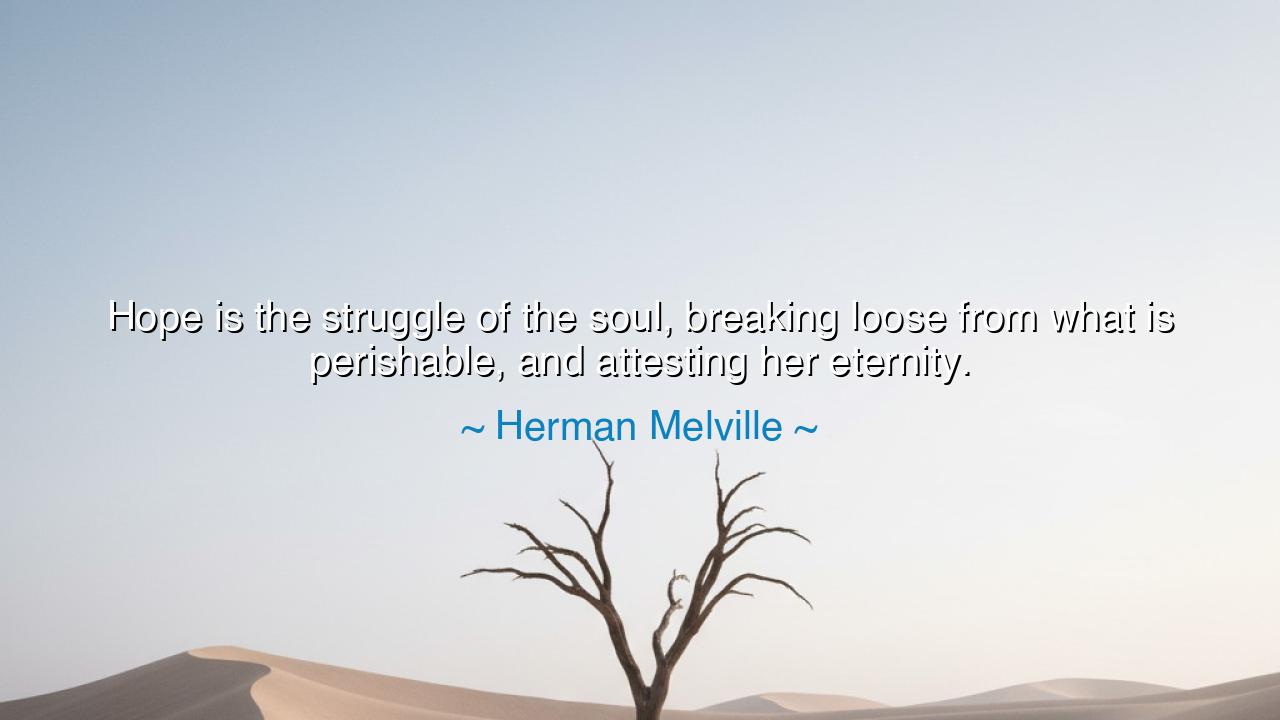
Hope is the struggle of the soul, breaking loose from what is
Hope is the struggle of the soul, breaking loose from what is perishable, and attesting her eternity.






“Hope is the struggle of the soul, breaking loose from what is perishable, and attesting her eternity.” — thus wrote Herman Melville, the sailor-philosopher, whose pen charted not only the vast oceans of the earth but the boundless depths of the human spirit. In this sentence, carved like scripture from the stone of sorrow and revelation, Melville defines hope not as mere optimism, but as the rebellion of the eternal within us against the decay of the flesh. It is not a lighthearted wish; it is a sacred struggle — the soul’s defiance of time, pain, and mortality. To hope, in Melville’s vision, is to remember that within us dwells something death cannot touch.
The origin of this quote springs from Melville’s lifelong wrestling with despair, faith, and the meaning of human existence. Having voyaged through storms both literal and spiritual, he came to see hope as the most paradoxical of virtues — fragile, yet immortal. The author of Moby-Dick, that grand allegory of man’s confrontation with the infinite, Melville understood that the world is full of perishables — bodies, fortunes, nations, and even dreams — yet within the human heart lies a spark that refuses annihilation. Hope is that spark: not naive belief in a happy ending, but the soul’s refusal to die even when surrounded by ruin.
In calling hope “the struggle of the soul,” Melville gives it the gravity of an inner war. It is not easy or passive; it demands endurance, courage, and faith in the unseen. The ancients, too, knew this truth. The Stoics spoke of the logos — the divine order within the universe — and taught that when one lives in harmony with it, one finds peace even in suffering. The Christian mystics called it grace; the Hindu sages called it ātman, the self eternal and undying. All of them pointed to what Melville names here: that in each of us there is something that longs to rise, to break free from the perishable, to testify that we are more than dust. To hope, then, is not to ignore reality, but to assert the truth of eternity within the limits of mortality.
This truth can be seen most vividly in those who have endured suffering without surrender. Consider Nelson Mandela, imprisoned for twenty-seven years in a cell barely wide enough to stretch his arms. Each day was a repetition of stone and silence, a living tomb. Yet his spirit did not wither. “Hope,” he later said, “is a powerful weapon, and no one can imprison it.” In his endurance, we see Melville’s meaning made flesh: Mandela’s soul struggled and broke loose from the perishable, proving that the body may be bound, but the spirit is infinite. His hope was not comfort; it was battle — and through it, he attested his eternity.
Melville’s vision of hope also warns us: it is not the denial of death, but the transcendence of it. For everything that is perishable — our youth, our possessions, our status — will pass away. To cling to them is to build one’s house upon sand. But when the soul learns to hope not in the things of the world but in something beyond it — in truth, in love, in meaning — then it begins to participate in the eternal. Hope, therefore, is the proof of divinity in humanity, the bridge between what dies and what endures. It is the soul’s declaration: “I am not merely of earth; I am of heaven.”
In this light, even despair becomes sacred, for despair is the shadow that reveals the presence of hope. Without suffering, there would be no need for hope, and without hope, the soul would forget her eternal nature. The struggle that Melville speaks of — the breaking loose — is not the escape from pain, but the transformation of it. When one suffers, and yet continues to believe, to love, to create, one performs the miracle of hope: turning the perishable into the eternal. Every act of compassion, every whisper of forgiveness, every song sung in the dark — these are the soul’s proof of its immortality.
Therefore, O listener of tomorrow, remember this teaching: do not confuse hope with ease. It is not a feather drifting on the wind; it is a flame that burns against the storm. When life decays, when all seems lost, let your soul struggle, for in that struggle you touch eternity. Nourish hope not by denying death, but by affirming life — by seeking beauty, by doing good, by holding fast to meaning. As Melville reminds us, you are not a creature of the perishable world, though you walk within it. You are a spark of the divine, and your hope — your refusal to surrender to despair — is the proof that within you lives something eternal. So fight, hope, and rise — for even in the darkest sea, the soul that hopes becomes its own lighthouse of immortality.






AAdministratorAdministrator
Welcome, honored guests. Please leave a comment, we will respond soon